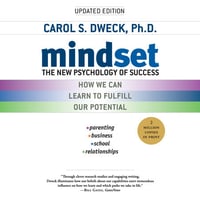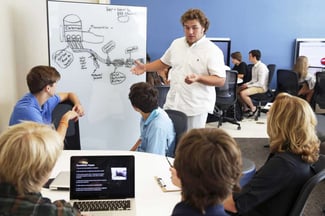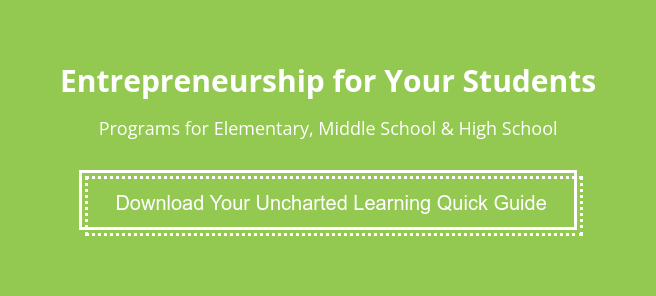 I love the Legend of Zelda games. All of them. I’ve spent years of my life playing Zelda in all its various forms, all toward one end: Rescuing Princess Zelda and saving Hyrule from the grasp of the dreaded Ganon.
I love the Legend of Zelda games. All of them. I’ve spent years of my life playing Zelda in all its various forms, all toward one end: Rescuing Princess Zelda and saving Hyrule from the grasp of the dreaded Ganon.
The relationship between video games and entrepreneurship education is strained, to say the least, but if looked at through the lens of developing the Growth Mindset—and maybe squint a little—the two have a few things in common.
Recap of the Growth Mindset

Growth Mindset is the idea that, with effort, it's possible to increase intelligence and ability. According to researcher Carol Dweck, “In a growth mindset, people believe that their most basic abilities can be developed through dedication and hard work—brains and talent are just the starting point.”
Growth Mindset establishes a love of learning and a special kind of resilience in entrepreneurship students and learners of all ages. Students who demonstrate a growth mindset believe their abilities develop over time. Research shows that students with growth mindsets tend to seek out more opportunities to gain new knowledge and broaden their skills, and do not typically shy away from challenges.
So, what does Zelda have to do with any of this? Video games give us a unique view into the personality of students. What does it take to beat a video game? Hours and hours of time? Dedication, persistence, grit, determination, and creativity?
I don’t think that many parents would equate their “discussions” with their children about spending too much time on Fortnite island with building key skills they will use in real life, but there may be a kernel of truth in there somewhere.
Growth Mindset Games
While you may not have the desire (or budget) to let every student play video games, there are tons of entrepreneurship games for students that help teach them how to work hard and learn from failure. These growth mindset games for students help get the gears turning and teach students how to persevere through problems.
Set (or Set Jr.)
Set is the type of game that might make students frustrated as they try to figure out the “secret” to cracking the code, and that’s exactly why it’s great for strengthening a Growth Mindset! Set is a classic visual-spatial and mathematics game. Set Jr. is the same but geared towards a younger group of students (think freshINCedu).
Don’t know how to play Set? It’s easy! Students must identify whether a set of 3 exists within 12 face-up playing cards, based on specific criteria. The best part? Students can play in large groups, small groups, on their own, and even online.
Plan of Action
Failure is inevitable. As much as you may wish you could shield your kiddo from failure, learning from failure is an invaluable step in students’ development. The “Plan of Action” activity helps students develop a plan for facing inevitable failures.
Start by asking your students to identify a time they faced a challenge. Then, ask them to reflect on the following questions:
- What happened?
- What was the result?
- What were you thinking at the time?
- What did you learn that might help you in the future?
- What new ideas do you have moving forward?
- What's your new plan?
- What will you think about to keep yourself motivated?
Growth Mindset Escape Room
A few years back, escape rooms gained popularity among… well, pretty much everyone! And they can be a great tool for helping instill a growth mindset in your students. For this game, divide students into small groups (use breakout sessions if you’re distance-learning.) Provide each group with a series of puzzles and clues to help them solve whatever mystery you’ve laid out. Escaping the exercise requires students to practice patience, problem-solving, and collaboration.
How to Develop a Growth Mindset in Students

When Carol Dweck’s Mindset was published in 2007, schools immediately saw the application of how the growth mindset could help their student populations grow and evolve, and to be prepared for life after the classroom. To set the stage, Dweck’s study basically found that some students generally fell into two categories:
- Growth Mindset Students know that they can develop their talents and skills, and are receptive to learning and feedback. In general, they believe they can improve their abilities with hard work and persistence to learn new things.
- Fixed Mindset Students feel that their intelligence, skills, and talents are fixed and they may at times resist learning or trying to improve when something is challenging. They may just give up when they do not understand something.
Developing Growth Mindset in Students
The ways that schools have begun to incorporate and foster the growth mindset among students are wide-ranging, but generally fall into a few key behaviors.
- Establishing high expectations for students, not just high standards
- Creating a risk-tolerant environment where failure is not the end of the world and is not the only reflection of a grade
- Providing feedback to students that do not focus on traits or abilities, but instead on the process, effort, and persistence of the student
- Helping students understand that their minds can grow and that their ability to be successful is based on their ability to push themselves toward success
Implementing these types of behaviors in schools does not lie solely with administrators. Growth Mindset is taught by those closest to students: Teachers.
Leading By Example
Inherent in teachers is the desire to see students succeed and so many great teachers have themselves been embracing the growth mindset their whole lives, by being life-long learners. Great teachers are great learners and are always pushing themselves to become better at their jobs and better for their students.
When it comes to fostering the Growth Mindset in schools, teachers are the key. Teachers know and interact with each student every day. To create classrooms where challenges are not opportunities to fail, but opportunities to grow and learn, entrepreneurship teachers must lead by example.
Now why this long diatribe about the growth mindset? We know it is critical for students to embrace the growth mindset, but it is also important to be given the opportunities to practice the growth mindset. STEM clubs, Makerspaces, chess clubs, music classes are all environments that give students opportunities to develop their growth mindset by solving problems or testing new ideas. But opportunities to fail and prescriptively learn from those failures are more challenging to find.
How Uncharted Learning Fosters Growth
Uncharted Learning is on a mission to take students to new places in their learning and promote the development of a growth mindset. To instill in students an intrinsic desire to learn, grow, and explore beyond the boundaries of conventional classrooms through student entrepreneurship and coding programs.
INCubatoredu

The INCubatoredu program and its feeder programs, mxINCedu and freshINCedu, use the lens of entrepreneurship to guide students through the authentic and rigorous process of building their own businesses. In this program, students identify and solve a unique business need, like where to find tasty cookies for people with food allergies, or developing pots that don’t fill landfills.
Through this process, students embrace the growth mindset by building, testing, failing, iterating, and rebuilding. They refine their product or service as many times as it takes until it solves the problem they’ve identified for their target market.
Along the way, students encounter real business challenges and learn core business principles firsthand that they apply directly to their individual ventures. All the while, they get to work with amazing coaches and mentors from their communities, gaining valuable experience they can carry into college and their careers.
MobileMakersEdu Program
The MobileMakersEdu program helps establish a student growth mindset through iOS coding. In this program, students don’t just study the theory behind code. They dive headfirst into User Experience and write code that enables UI to work. Every year, students create and build their own apps—a skill that requires not only flexible thinking, but ultimate determination, creativity, and grit.

Imagine trying to use an app that doesn’t work well. Then imagine diving into the code behind the app to figure out why it doesn’t work. You try something new, change something small, build and rebuild your code until hours later you finally get the app to work. MobileMakersEdu students solve problems like these in real-world settings while stretching and growing their thought processes in new ways.
Gaming the Way Toward Growth
As much as these programs have tools built in that push students in new ways and facilitate new opportunities to grow in their learning, there is still a single person at the head of the classroom who plays the “host with the most.”
Teachers position students for success, putting into practice those key behaviors that foster a growth mindset in the classroom. And they are doing it on an individual basis, as each and every student is different and requires a different level of support from their teacher. By helping students understand the big idea behind the Growth Mindset—the notion that they can learn and grow—we know the teacher is the key.
So, teachers, if you’re looking for new ways to foster the Growth Mindset in your students, may we suggest turning to games. From daily activities to online puzzles, games are a helpful, practical, and fun way for entrepreneurship students to grow.
And for the record, Link is way cooler than those fancy Fortnite dancers.
